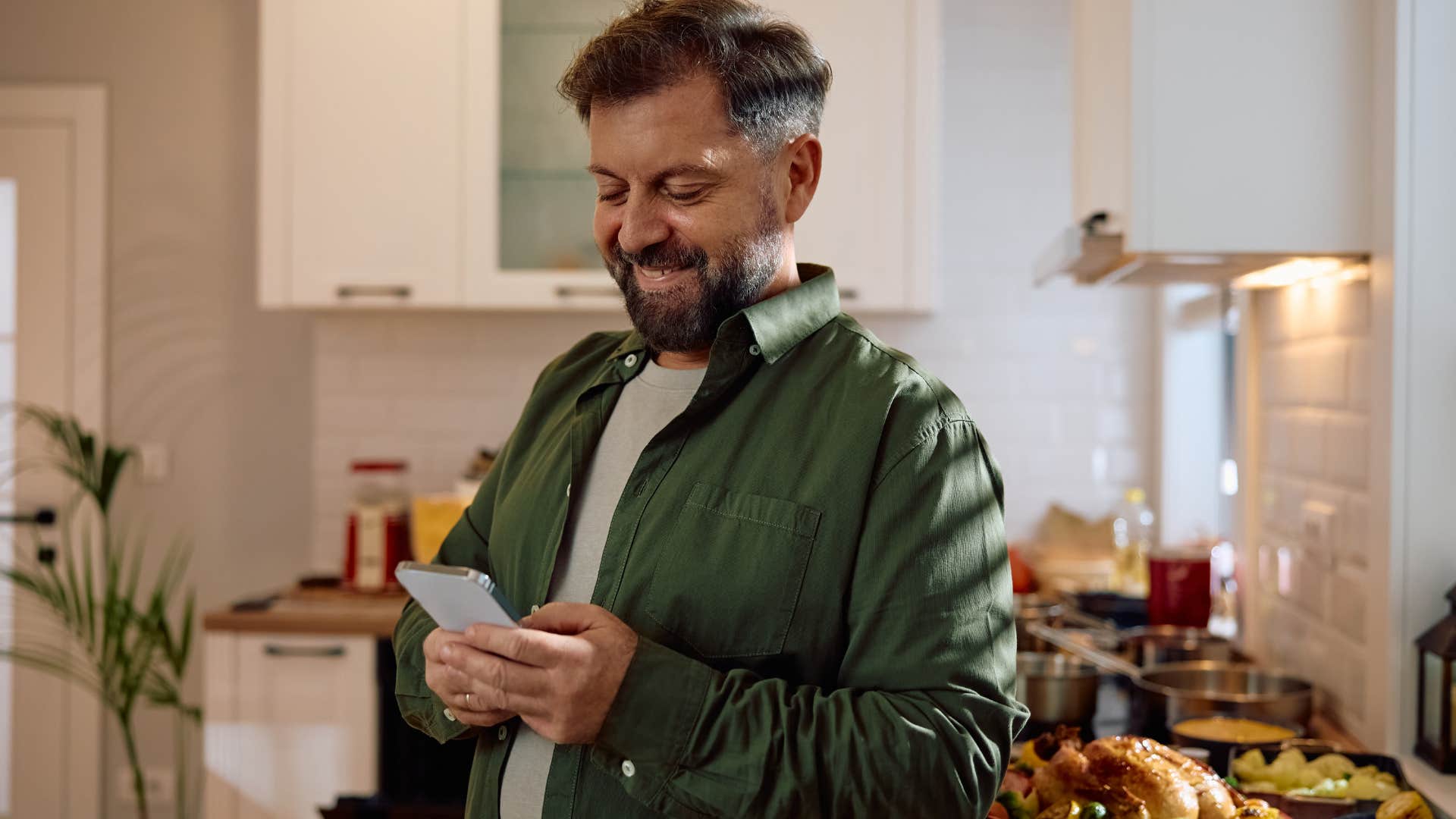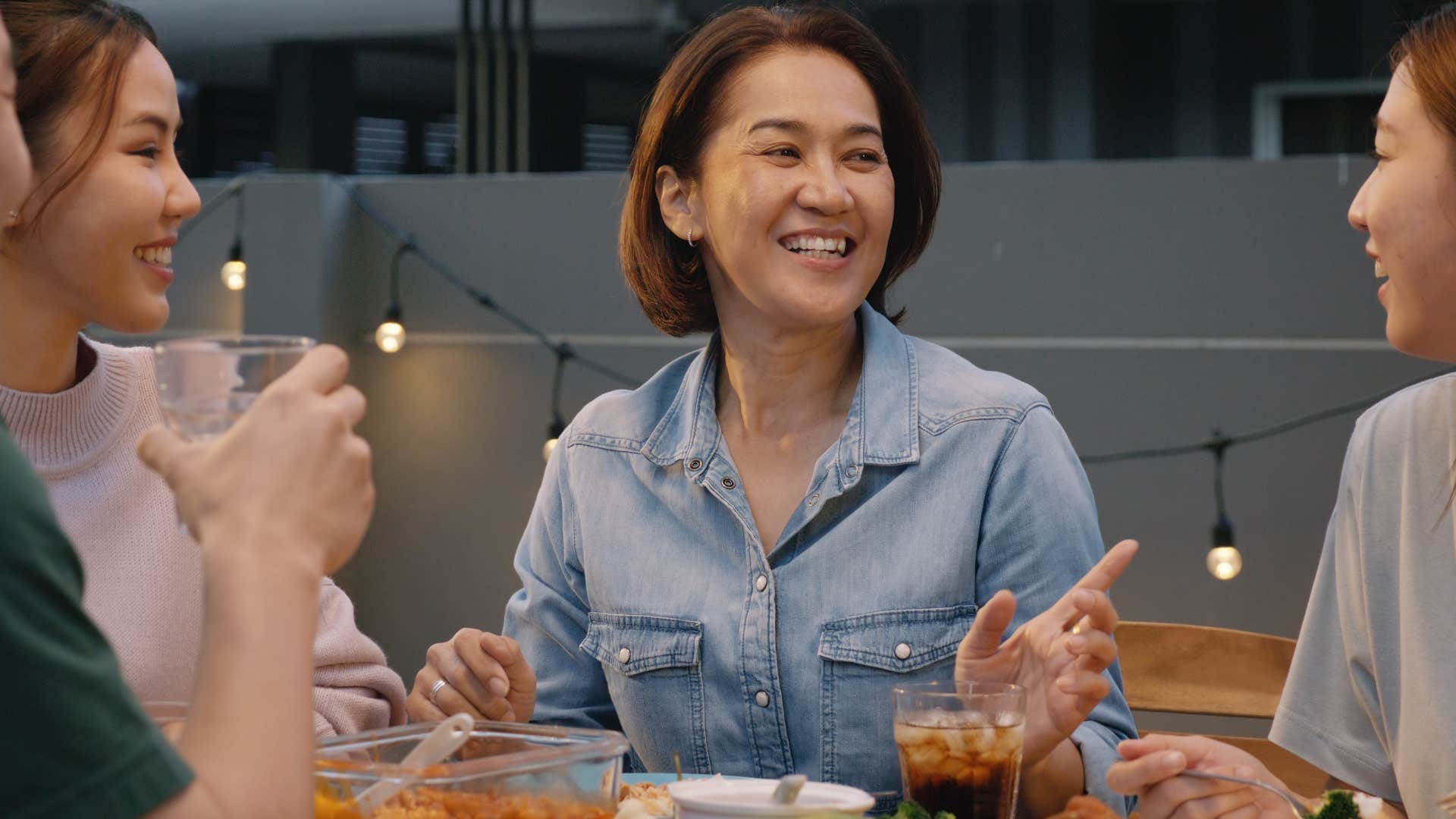11 Common Things People With Good Manners Never Do At A Dinner Table
These basic manners are sadly becoming rarer than you might think.
 frantic00 / Shutterstock
frantic00 / Shutterstock While there are certainly plenty of outdated etiquette rules and traditional expectations still being followed by most people, studies show that proper table manners, like keeping your elbows off the table and chewing with your mouth closed, are declining among people in younger generations like Gen Z.
Whether that's a side effect of social isolation or defiance of traditional norms, there are still some common things people with good manners never do at a dinner table, regardless of their age. So, if you’re hoping to make a good first impression or trying to earn respect at a professional dinner, consider prioritizing a few of these basic table manners.
Here are 11 common things people with good manners never do at a dinner table
1. Reach across the table
 La Famiglia | Shutterstock.com
La Famiglia | Shutterstock.com
General expectations and manners are cultivated by the environment, according to a study published in the Personality and Social Psychology Bulletin. For example, expectations to be quiet and mindful at libraries are much different than a classroom or a conversation with close friends. In the same way, depending on who you’re around and what kind of dinner you’re having, manners will shift.
However, many of the common things people with good manners never do at the dinner table apply to most environments, like reaching across the table. When you reach across someone, putting them at risk for being spilled on or needing to move, you’re not respecting their space. Sometimes, it’s impossible to avoid, but using a phrase like “pardon my reach” or “excuse me” to make someone feel seen and appreciated makes all the difference.
2. Chew with their mouth open
 frantic00 | Shutterstock.com
frantic00 | Shutterstock.com
According to a study from Sound Proof Pros, people chewing with their mouths open is collectively considered one of the most annoying sounds, which is partially why it’s still considered one of the worst table manners a person can engage in.
Even if that means taking smaller bites, covering their mouth with a napkin, or intentionally taking bites in between conversations, chewing with their mouth open is one of the common things people with good manners never do at the dinner table. This not only helps people to feel more comfortable and less annoyed, but it also ensures you’re being perceived as a mindful and confident person at the dinner table.
3. Use their phone
 Drazen Zigic | Shutterstock.com
Drazen Zigic | Shutterstock.com
Using your phone at dinner can make you more personally unhappy, but that shouldn’t be the only reason you avoid it as a distraction at a social event or during a conversation. Keeping your phone out of sight helps to foster better conversation and social interactions, especially at a dinner table intended to connect people in a more meaningful way.
That’s exactly why it’s one of the common things people with good manners never do at a dinner table. They look out for their own well-being and happiness, as well as that of the people around them.
4. Interrupt people
 Hananeko_Studio | Shutterstock.com
Hananeko_Studio | Shutterstock.com
When people feel unseen and unheard in conversations, sometimes caused by consistent interruptions or even physical distractions like a phone, their relationships erode. While it may seem obvious or an issue of respect rather than just about obeying table manners, making space for people to contribute to conversations is important.
You’ll have a chance to speak and talk about yourself, but your first priority should always be to actively listen to other people and avoid interruptions that might make them feel insecure or uncomfortable.
5. Put their elbows on the table
 ArtOfPhotos | Shutterstock.com
ArtOfPhotos | Shutterstock.com
According to historian and etiquette expert Margaret Visser, the origin of the rule of keeping your elbows off the table started with avoiding violence at the table. By keeping your elbows off the table and having a more open body language, you avoid a posture that’s inherently threatening or abrasive.
While the reasoning behind this basic etiquette practice may look different now and simply be a matter of respecting shared space, it’s still one of the common things people with good manners never do at a dinner table.
6. Forget to say ‘please’ or ‘thank you’
 Chay_Tee | Shutterstock.com
Chay_Tee | Shutterstock.com
While basic manners like saying “please” have been steadily decreasing across all age groups, according to a study from the Social Psychology Quarterly, refusing to express gratitude or offering “thanks” to a host is still one of the common things people with good manners never do at a dinner table.
Even if it’s thanking someone for passing a dish or making a meal, small gestures of kindness and praise can be more profound than most people realize. It not only makes them feel valued and seen amid the chaos of hosting or being around people, it also personally bonds you and helps foster a healthier, more meaningful relationship.
7. Lick their fingers
 Prostock-studio | Shutterstock.com
Prostock-studio | Shutterstock.com
Not only is licking your fingers during a meal incredibly unsanitary, it’s also one of the habits that people with good manners never do at a dinner table. Of course, in certain environments and cultures, it’s completely normal, and sometimes, even celebrated, but in many Western households, it’s not just bad manners, it’s annoying for everyone around you.
Whether that means loading up on napkins or using utensils, being mindful about the people around you is key.
8. Criticize the food
 MDV Edwards | Shutterstock.com
MDV Edwards | Shutterstock.com
Even if you’re a brutally honest or blunt person, criticizing the person hosting you at their house or making food for you is one of the common things people with good manners never do at the dinner table. It doesn’t have to be your favorite meal to express gratitude, but saying thank you and keeping negativity to yourself can have more profound positive effects than many people believe.
According to UCLA Health experts, it’s not just impactful for personal mental health to express gratitude, it’s also foundational to social connections and physical well-being, as well. So, while it seems innocent, keeping negativity inside and opting for gratitude isn’t just having good manners. It’s also impactful for well-being and relationships in general.
9. Leave abruptly
 insta_photos | Shutterstock.com
insta_photos | Shutterstock.com
When you go to someone’s house for dinner or out to eat on a date, it’s great manners to be mindful of their space and communicate. Even if that means excusing yourself to use the restroom, don’t just leave the table.
Leaving abruptly without saying a word is one of the common things people with good manners never do at a dinner table, unless it’s absolutely necessary, because they respect others enough to keep them looped in.
10. Make the conversation all about them
 SG SHOT | Shutterstock.com
SG SHOT | Shutterstock.com
People who commit to active listening rather than making conversations all about themselves tend to foster better interactions and relationships than those who don’t, according to a study published by the International Journal of Listening.
Whether it’s asking thoughtful questions, adopting positive body language, or simply prompting people to speak about themselves, overtaking the conversation is one of the common things people with good manners never do at the dinner table.
11. Not offer to help clean up
 Adriaticfoto | Shutterstock.com
Adriaticfoto | Shutterstock.com
When you’re eating at someone’s house or being hosted for dinner, it’s basic table manners to ask if they need help. Whether that means cleaning up plates, finishing the meal, or even facilitating a conversation, some of which don’t need to be prompted to support, it’s one of the manners most good people commonly engage in at a dinner table.
Of course, outside of simply being good table manners, adopting habits centered around giving back, helping people, and engaging in small acts of kindness, even if it’s at your family dinner table, can help to lower stress levels. So, not only are you helping other people feel seen and valued, you’re protecting your health and well-being, as well.
Zayda Slabbekoorn is a staff writer with a bachelor’s degree in social relations & policy and gender studies who focuses on psychology, relationships, self-help, and human interest stories.

